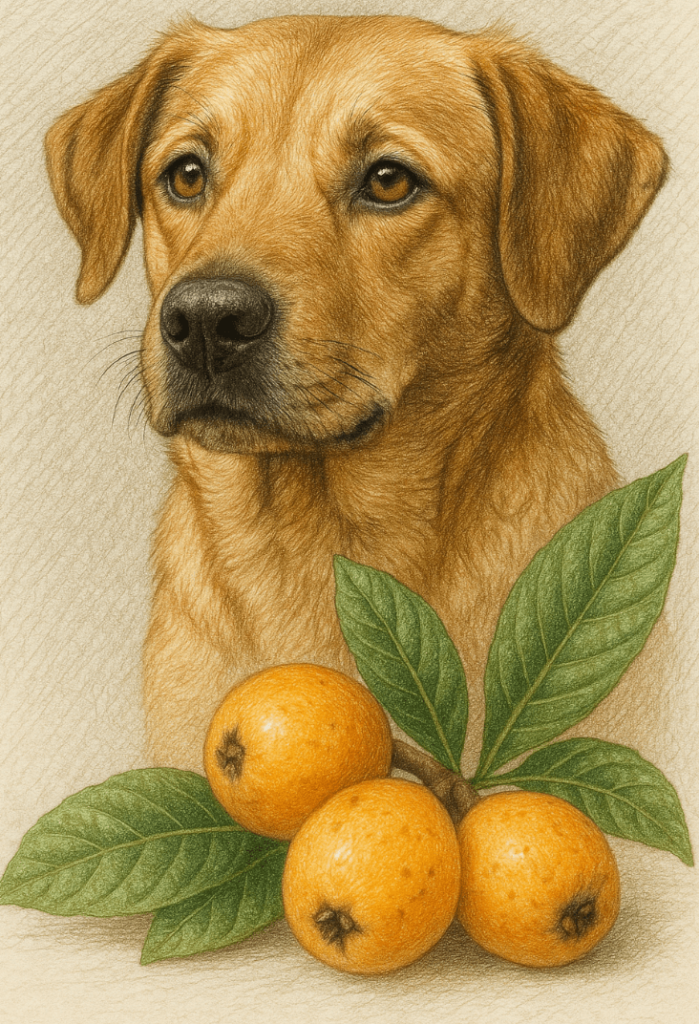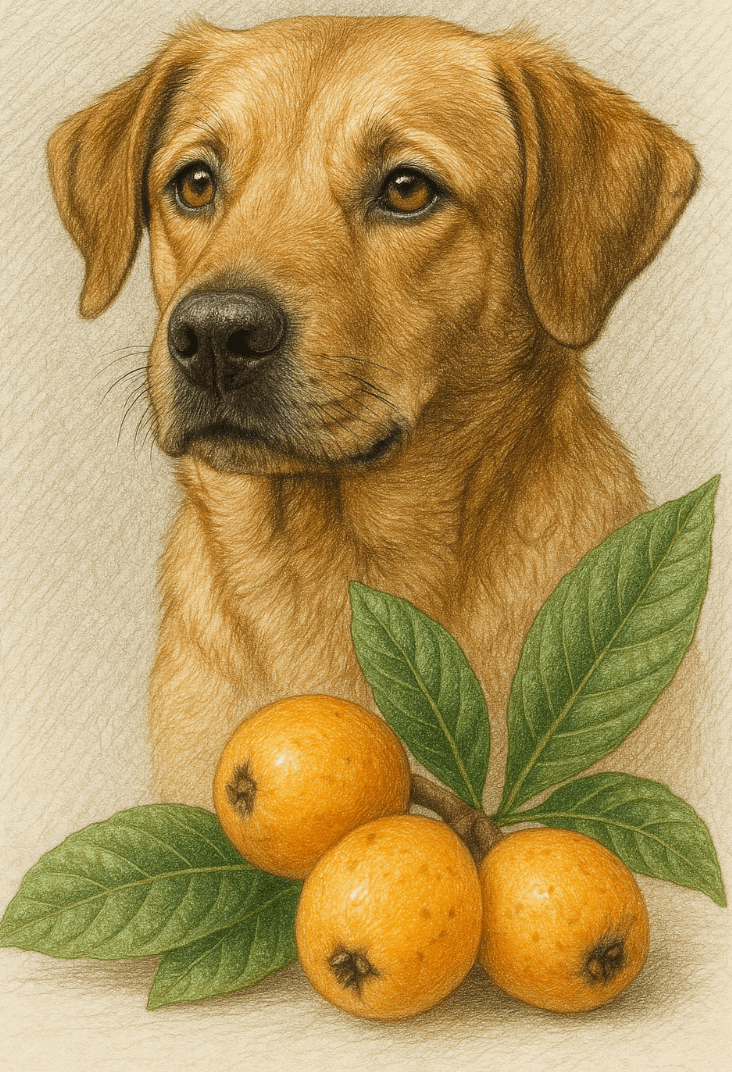Can Dogs Eat Loquats? A Comprehensive Guide for Pet Owners
Loquats, also known as Japanese plums, are sweet, tangy fruits that many people enjoy during their peak season. But what about our furry friends? Can dogs eat loquats, or should they be avoided altogether? As pet owners, it’s natural to wonder whether sharing a piece of fruit with your dog is safe or potentially harmful. While loquats are not toxic to dogs, there are important considerations to keep in mind before offering them as a treat. In this blog post, we’ll explore everything you need to know about feeding loquats to your dog, including potential risks, benefits, and safe preparation tips. Let’s dive in and ensure your pup stays happy and healthy!
Potential Benefits of Feeding Loquats to Dogs
When offered in moderation, loquats can provide some nutritional benefits for dogs. However, it’s essential to understand their role in your dog’s diet and how they contribute to overall health.
Rich in Vitamins:
Loquats contain vitamins A, C, and E, which support immune function, skin health, and overall vitality.Hydration Boost:
With their high water content, loquats can help keep your dog hydrated, especially during warmer months.Low in Calories:
These fruits are low in calories, making them a guilt-free treat option for dogs watching their weight.Natural Fiber Source:
The fiber in loquats can aid digestion and promote a healthy gut when given in appropriate amounts.Antioxidant Properties:
Loquats are packed with antioxidants, which help combat oxidative stress and inflammation in your dog’s body.
While these benefits make loquats an appealing treat, moderation is key to avoid any adverse effects.
Risks of Feeding Loquats to Dogs
Despite their nutritional value, loquats come with certain risks that every dog owner should be aware of. Understanding these hazards ensures your dog’s safety while enjoying this fruit.
Choking Hazard from Seeds:
Loquat seeds are large and hard, posing a choking risk if swallowed whole. Always remove seeds before offering the fruit.Toxic Compounds in Seeds:
The seeds contain small amounts of cyanogenic glycosides, which can release cyanide if ingested. Never let your dog chew on or swallow the seeds.Digestive Upset:
Eating too much fruit, including loquats, can lead to diarrhea, vomiting, or an upset stomach due to their sugar content.Allergic Reactions:
Some dogs may be allergic to loquats, resulting in symptoms like itching, swelling, or difficulty breathing. Monitor closely after the first try.High Sugar Content:
Excessive sugar intake can contribute to obesity or worsen conditions like diabetes in dogs. Limit loquat portions accordingly.
By being mindful of these risks, you can safely incorporate loquats into your dog’s diet without compromising their health.
Check this guide 👉Can Dogs Eat Kumquats? Best 7 Expert Tips!
Check this guide 👉Can Dogs Eat Roses? Best 7 Expert Tips!
Check this guide 👉Can Dogs Eat Rutabaga? Best 7 Expert Tips!

Safe Practices When Feeding Loquats | Things to Avoid When Feeding Loquats |
|---|---|
Remove all seeds before serving | Offering large pieces that could choke |
Serve only ripe, fresh loquats | Allowing dogs to eat unripe or spoiled fruit |
Limit portion sizes to avoid overfeeding | Giving loquats daily or in excess |
Cut fruit into small, bite-sized pieces | Ignoring signs of digestive distress |
Consult your vet before introducing new foods | Feeding loquats to dogs with dietary restrictions |
How to Safely Prepare Loquats for Your Dog
Preparing loquats correctly is crucial to ensure they’re safe for your dog to eat. Follow these steps to minimize risks and maximize enjoyment.
Choose Ripe Fruits:
Select soft, fragrant loquats that are free of blemishes or mold. Unripe fruits can cause stomach upset.Remove Seeds Completely:
Carefully cut the fruit open and discard all seeds to prevent choking or toxicity.Wash Thoroughly:
Rinse the fruit under running water to remove dirt, pesticides, or other contaminants.Cut Into Small Pieces:
Slice the loquat into bite-sized chunks to make it easier for your dog to chew and digest.Offer in Moderation:
Start with a small piece to see how your dog reacts, then limit future servings to occasional treats.
Proper preparation ensures your dog enjoys loquats safely without any negative consequences.
Signs Your Dog May Have Eaten Too Many Loquats
Even with precautions, accidents can happen if your dog consumes too many loquats. Watch for these warning signs to address potential issues promptly.
Vomiting or Diarrhea:
Gastrointestinal distress is a common sign of overeating sugary fruits like loquats.Lethargy or Weakness:
Consuming toxic compounds from seeds or excessive sugar can leave your dog feeling unusually tired.Difficulty Breathing:
If cyanide poisoning occurs (rare but possible), your dog may exhibit labored breathing or panting.Excessive Drooling:
Nausea or irritation in the mouth can cause increased drooling after eating loquats.Loss of Appetite:
A sudden refusal to eat may indicate discomfort or illness caused by consuming too much fruit.
Recognizing these symptoms early allows you to seek veterinary care quickly, preventing further complications.
Common Mistakes to Avoid When Feeding Loquats to Dogs
Feeding loquats to dogs requires careful attention to avoid common pitfalls that could harm your pet. Here are some mistakes to steer clear of.
Leaving Seeds Intact:
Forgetting to remove seeds is one of the most dangerous errors, as they contain harmful compounds.Overfeeding Loquats:
Giving too many loquats at once can overwhelm your dog’s digestive system and lead to discomfort.Serving Unripe Fruit:
Unripe loquats are harder to digest and may cause stomach upset or even toxicity in large amounts.Ignoring Food Allergies:
Not all dogs tolerate new foods well; failing to monitor for allergic reactions can result in serious health issues.Assuming All Dogs React the Same Way:
Each dog is unique—what works for one may not work for another, so always proceed with caution.
Avoiding these mistakes ensures a safer experience for your dog when trying loquats.
Healthier Alternatives to Loquats for Dogs
If you’re unsure about feeding loquats to your dog, there are plenty of alternative fruits that are equally nutritious and safer.
Apples (Seedless):
Apples are rich in fiber and vitamin C, making them a great low-calorie snack for dogs.Blueberries:
Packed with antioxidants, blueberries are tiny powerhouses that support brain and immune health.Watermelon (Seedless):
This hydrating fruit is perfect for hot days, providing a refreshing and low-calorie treat.Strawberries:
Strawberries offer vitamins, fiber, and enzymes that promote dental health in dogs.Pears (Seedless):
Like apples, pears are a safe and sweet option that provides similar nutritional benefits.
These alternatives allow you to diversify your dog’s treats without worrying about potential risks.
Understanding Your Dog’s Nutritional Needs
Before introducing any new food, including loquats, it’s important to consider your dog’s overall nutritional requirements.
Balanced Diet First:
Ensure your dog’s primary diet meets all their nutritional needs before adding treats like loquats.Portion Control Matters:
Treats should never exceed 10% of your dog’s daily caloric intake to maintain a healthy weight.Consider Age and Size:
Smaller dogs and puppies require smaller portions, while larger breeds can handle slightly bigger servings.Monitor for Sensitivities:
Some dogs have sensitive stomachs or allergies, so always introduce new foods gradually.Consult Your Veterinarian:
Your vet can provide personalized advice based on your dog’s breed, age, and health status.
Understanding these factors ensures you make informed decisions about your dog’s diet and treat choices.
Frequently Asked Questions About Dogs and Loquats
Are loquats toxic to dogs?
No, the fruit itself is not toxic, but the seeds contain small amounts of cyanogenic compounds that can be harmful if ingested.
How much loquat can I give my dog?
Stick to one or two small pieces as an occasional treat, depending on your dog’s size and dietary needs.
Can puppies eat loquats?
Puppies have sensitive digestive systems, so it’s best to avoid giving them loquats until they’re older.
What should I do if my dog eats a loquat seed?
Monitor your dog closely for signs of distress, and contact your veterinarian immediately if symptoms arise.
Are there alternatives to loquats for dogs?
Yes, safer fruits like apples (seedless), blueberries, or watermelon make excellent treats for dogs.
Feeding Loquats to Your Dog: A Balanced Approach
Loquats can be a tasty and nutritious treat for dogs when prepared and served responsibly. By removing seeds, cutting the fruit into manageable pieces, and limiting portion sizes, you can safely share this delightful fruit with your furry friend. However, always prioritize your dog’s overall diet and consult your veterinarian before introducing new foods. Remember, moderation and vigilance are key to ensuring your dog enjoys loquats without any adverse effects. With proper care, you can add a little variety to your pup’s menu while keeping them healthy and happy!
Do Cats Have Taste Buds? Best 7 Expert Tips! – Discover how cats experience flavors and why their taste is so unique.
Do Dogs Have Taste Buds? Best 7 Expert Tips! – Discover how dogs experience taste, their preferences, and what it means for their diet and health.
Can Cats Taste Sweet? Best 7 Expert Tips! – Discover why cats can’t taste sweetness, how it affects their diet, and tips to keep them healthy and happy.
Can Dogs Taste Sweet? Best 7 Expert Tips! – Discover how dogs perceive sweetness, which foods are safe, and tips to manage their sweet cravings responsibly.





